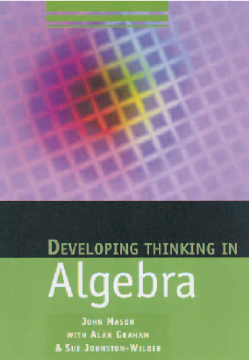
Additional Information
Book Details
Abstract
'This is an incredibly interesting and thought provoking book. Intended for anyone interested in developing their own mathematical thinking, or of the students they teach, whether at a primary level or right through to FE. The book is a delightful blend of theory and practice - encouraging the reader to participate, to solve problems and to develop their own thinking' - Peter Hall, Imberhorne School, East Grinstead. Algebra has always been a watershed for pupils learning mathematics. Nevertheless pupils bring to school all the necessary natural powers for thinking algebraically, including organizing, classifying and generalizing. Developing Thinking in Algebra enables teachers and their support staff to experience and to teach algebraic thinking to pupils aged seven to 16 years. By integrating pedagogy and subject knowledge through experiencing a variety of tasks for learners, readers of this book will see how to engage all learners in successfully thinking algebraically. This book is the course reader for The Open University Course ME625 Developing Algebraic Thinking
Table of Contents
| Section Title | Page | Action | Price |
|---|---|---|---|
| Preface (Deborah Eade) | |||
| 1. Introductory overview (Andrea Cornwall) | |||
| 2. Development as a buzzword (Gilbert Rist) | |||
| 3. Words count (Naomi Alfini and Robert Chambers) | |||
| 4. Poverty reduction (John Toye) | |||
| 5. Social protection (Guy Standing) | |||
| 6. Globalisation (Shalmali Guttal) | |||
| 7. The F-word and the S-word (Cassandra Balchin) | |||
| 8. Participation (Pablo Alejandro Leal) | |||
| 9. Citizenship: a perverse confluence (Evelina Dagnino) | |||
| 10. Taking the power out of empowerment (Srilatha Batliwala) | |||
| 11. Social capital (Ben Fine) | |||
| 12. Reflections on relationships (Miguel Pickard) | |||
| 13. Talking of gender (Ines Smyth) | |||
| 14. Sustainability (Ian Scoones) | |||
| 15. From the right to development to the rights-based approach (Peter Uvin) | |||
| 16. Civil society (Neera Chandhoke) | |||
| 17. Public advocacy and people-centred advocacy (John Samuel) | |||
| 18. NGOs: between buzzwords and social movements (Islah Jad) | |||
| 19. Capacity building (Deborah Eade) | |||
| 20. Harmonisation (Rosalind Eyben) | |||
| 21. ‘Country ownership’ (Willem H. Buiter) | |||
| 22. Best of practices? (Warren Feek) | |||
| 23. Peacebuilding does not build peace (Tobias Denskus) | |||
| 24. The uncertain relationship between transparency and accountability (Jonathan Fox) | |||
| 25. Corruption (Elizabeth Harrison) | |||
| 26. ‘Good governance’ (Thandika Mkandawire) | |||
| 27. The discordant voices of security (Robin Luckham) | |||
| 28. Fragile states (Eghosa E. Osaghae) | |||
| 29. ‘Knowledge management’ (Robin Broad) | |||
| Coda (Deborah Eade) | |||
| Index |
